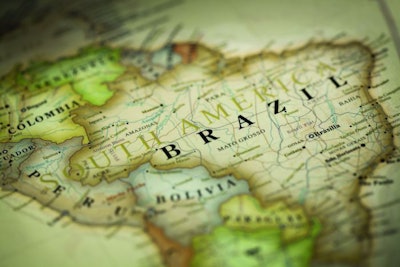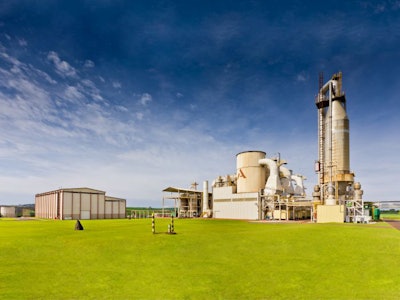
As the level of competition is tightening, Brazilian feed producers are ready to introduce innovative manufacturing technologies and product solutions.
The Brazilian animal feed sector saw good results in 2021 despite limited state support and consequences of the pandemic. Most feed producers are ready for further investments as local farmers are increasing spending on high-quality animal feed. The increased demand creates conditions for market consolidation and growth.
The animal feed sector of Brazil is steadily growing despite the pandemic and its consequences, which led to the suspension of many investment projects in the industry last year, according to recent statements made by representatives of some leading Brazil feed producers and industry analysts.
As Ariovaldo Zani, CEO of Brazilian feed industry association (Sindirações), said in an exclusive interview, the animal feed sector recorded growth of 4.3% in the first half of 2021.
“The increase of 4.3% maintains a good pace of progress, also observed in the same period in 2020,” Zani said. “From the pet sector to agriculture, the total production of feed is estimated at 81.2 million tons for the year. The second half trend is a reduction in the pace of demand, but even so, 2021 should have an estimated growth of 4% in feed production.”
According to Zani, the industry faced some serious challenges in 2021, among which were the extreme climatic factors (drought and frost) that compromised the productivity and supply of corn.
“Also, the sharp appreciation of the exchange indexed to imported inputs and agricultural commodities, i.e. soybeans, bran and corn, in addition to the scarcity of containers for import and consequent increase in the sea freight cost,” Zani said.
Acquisitions up
Despite the fact that Brazil became probably the country hardest hit by the pandemic in the entire Latin American region, which affected its agricultural and animal feed sector, many major global companies still consider the local feed market as one of the most promising for their growth.
The pandemic also led to consolidation in the market and the withdrawal of small producers by larger players. The latter in recent years have been able to strengthen their positions in the sector by acquisitions of their local rivals.
One of such companies is Trouw Nutrition, which is part of Nutreco that recently acquired Bigsal, one of the leading players in the Brazil cattle feed industry.
“The most important achievement for the company in 2021 is the Bigsal’s acquisition, an important cattle feed industry, with its factory strategically located in Rondônia, in the northern region of Brazil, which concentrates more than 20% of the Brazilian herd,” Saskia Korink, CEO of Nutreco. “This investment is essential to expand and strengthen Trouw Nutrition’s business in northern Brazil. This region needs new technologies to increase productivity and to growth.”
According to Korink, Bigsal’s acquisition further strengthens Trouw Nutrition’s presence in the growing Brazilian market, specifically in the beef and dairy sectors, and brings together a broad and modern product portfolio, including several product lines designed to increase livestock productivity.
In addition, Trouw Nutrition completed the acquisition of the Brazil farm mineral company Bellman in 2014.
This year, the company plans further investments in feed additives and premixes, as well as personnel, at its feed factories in Brazil.
Interest in feed additives
Other producers are also planning accelerating expansion in the Brazil animal feed market this year. That involves the launch of new products and expansion of the existing range.
In addition, as the level of competition is tightening, many producers plan to speed the introduction of some innovative production technologies in their manufacturing processes in order to raise competitiveness in the local market.
“Through Guabi, a company with which we have a strategic alliance, this year we started using total replacement technology in feed,” said Clodys Menacho, commercial director at Alltech Brazil. “We are also continuing to expand aquaculture and small producers markets so that we can bring our technologies to producers who are just starting out and who are also farming as a lifestyle. We want to continue expanding into [Brazilian] markets, such as beef, pork, poultry, aquaculture and pet food.”
The high cost of raw materials is driving interest in feed additive products that deliver better economic performance, Menacho added.
 Animal feed and feed additive companies continue to invest in Brazil. (Courtesy Alltech)
Animal feed and feed additive companies continue to invest in Brazil. (Courtesy Alltech)Growth outlook
Most of the interviewed analysts and producers say the Brazil animal feed market has big potential for a further growth in years to come.
“The FAO/UN informs that meat world production has to double by 2050 to meet the growing world population, which is expected to reach 10 billion people in three decades. In addition, it highlights that Brazil should be responsible for 40% of this number,” said Augusto Adami, Trouw Nutrition general manager – Brazil.
Brazil is one of the world’s largest producers of animal proteins. It is No. 1 in chicken, No. 2 in beef, No. 4 in milk, pork and farmed fish, and No. 6 in eggs, Adami noted. In addition, it has the second largest dog and cat population in the world.
This is also confirmed by recent data from the Brazilian Agricultural Research Corporation (Embrapa) that shows Brazilian food feeds nearly 1 billion people in 200 countries. According to analysts, that will contribute to the further growth of animal feed production in Brazil in the coming years.
According to experts, in recent years, many local producers have started to pay more attention to environmental issues as more productivity — often provided by quality animal nutrition — represents less land for production.
Government support
Due to weather challenges in this second part of the year, many Brazil farmers have expanded their investments in high-quality feed, which provides additional opportunities for animal feed producers.
Amid the conditions of the pandemic, the Brazil national government continues to provide the support to domestic animal feed producers and global companies, operating in the local market although in rather limited extent.
“The Federal Government — Ministry of Agriculture, Ministry of Economy, Ministry of Science and Technology — contributed to the attempt to ease the price of grains by suspending the import tax on corn, soy and bran from countries outside Mercosul, suspending the incidence of PIS/COFINS [federal taxes] in imported corn and through the Normative Resolution of the National Technical Biosafety Commission/CTNBio, which authorized the importation of genetically modified corn from the United States,” Zani said.
The adopted state measures to support the industry are also confirmed by producers.
“Brazilian agribusiness is an unregulated sector, based on supply and demand law,” Adami noted. “Right now, Brazilian government decided to cut two taxes on corn imports, the main important raw material, due to the harvest fell by almost 10 million tons and the exports had a significant growing. Both factors helped to raise domestic prices.”
Future investment
According to Menacho from Alltech Brazil, the company will follow the growth of the animal protein production chain, despite the global increase in the cost of grains. The focus is to work with producers to better optimize feed, as technologies optimize the profitability and quality of production.
In the meantime Trouw Nutrition plans to continue implementation of its merger and acquisition (M&A) policy in the Brazil feed market and the Latin American region in the near future.
“Trouw Nutrition remains seeking M&A opportunities in Brazil and Latin America to further strengthen its presence in these important animal protein markets,” Korink said.

















